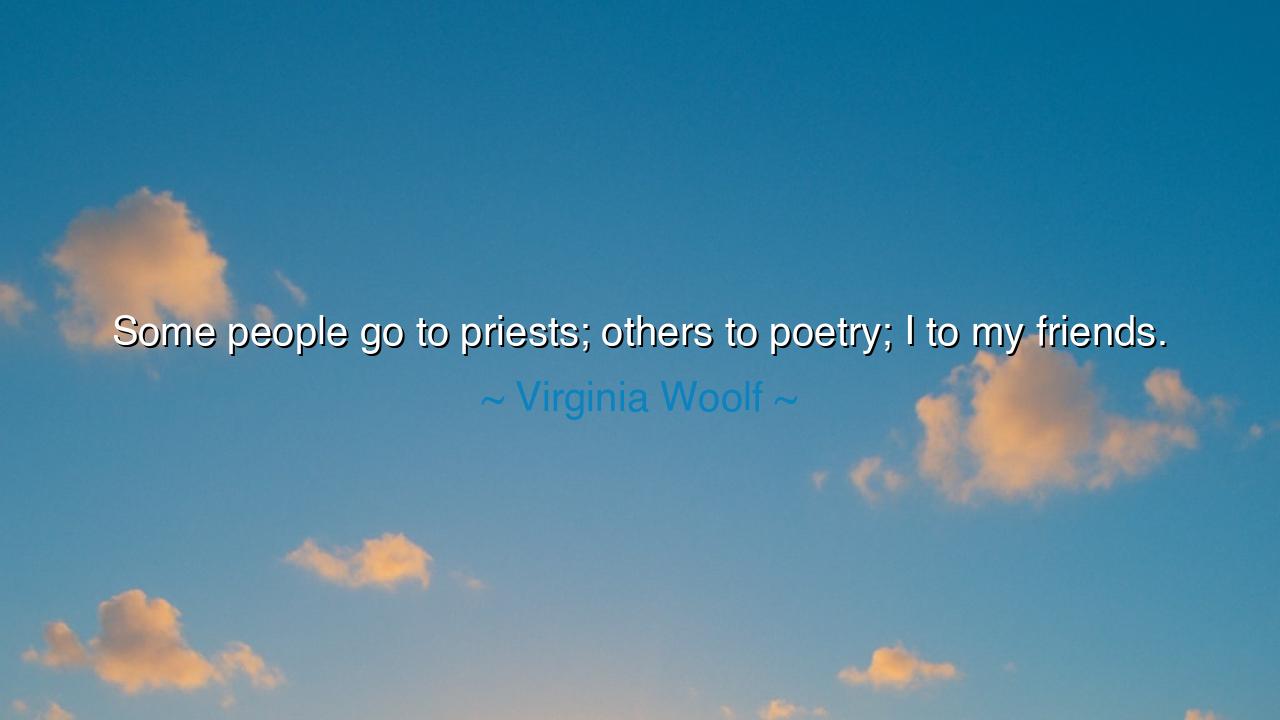
Some people go to priests; others to poetry; I to my friends.






Virginia Woolf, the weaver of thought and feeling, once wrote with quiet brilliance: “Some people go to priests; others to poetry; I to my friends.” In these few words, she unveiled the sacred truth of human consolation — that for her, friendship was both sanctuary and salvation. Where others sought divine guidance or artistic transcendence, she found her peace in the living temple of companionship. Woolf, who walked often along the edge of solitude and sorrow, understood that the soul seeks communion — a place to be seen, heard, and understood without judgment. And in her friends, she found that rare grace.
The origin of this quote arises from the heart of Woolf’s life and circle — the Bloomsbury Group, that constellation of writers, thinkers, and artists who defied convention and celebrated intellect and emotion alike. For Woolf, friendship was not a casual bond but a spiritual exchange. The priest offers confession; poetry offers beauty; but the friend offers understanding — the kind that binds one mortal to another across the fragile bridge of empathy. Through her words, she reminds us that friendship itself can be a kind of faith, a kind of art, and a form of healing that transcends all others.
To go to a priest is to seek absolution — to pour out one’s guilt and find forgiveness. To go to poetry is to seek meaning — to pour out one’s confusion and find beauty. But to go to a friend is to seek presence — to pour out one’s heart and find warmth. The friend listens, not as judge or mystic, but as mirror — reflecting back to us the strength we had forgotten and the humanity we feared we’d lost. Woolf’s words, gentle yet powerful, speak of the sacredness of this human connection. For in her own life, amid the shadows of despair, she often found her light not in sermons or in art alone, but in the laughter, letters, and companionship of those she loved.
Consider, for a moment, the example of C.S. Lewis and J.R.R. Tolkien, two souls who, like Woolf, found salvation in friendship. Both were men of faith and letters, each burdened with questions of meaning and morality. Yet it was their friendship that drew from them their greatest works. Lewis once said that friendship “is born at that moment when one person says to another, ‘What! You too?’” It is in that moment — that recognition, that shared spark — that the soul finds what neither prayer nor poetry alone can offer: the feeling of being understood. Through each other, they were strengthened; through friendship, their art and spirits grew.
Woolf, too, saw friendship as both confession and creation. With her friends, she shared her most private fears, her battles with self and society, and the aching questions of existence. They, in turn, gave her not solutions but presence — not sermons but sympathy. In her words, “I to my friends” is not a rejection of God or art, but an affirmation of human divinity — that within the bonds of love and loyalty, the sacred dwells. The divine, she implies, need not live only in temple or text; it lives in the listening heart of a friend.
Yet there is also humility in her truth. For friendship, unlike faith or poetry, asks not for worship, but for honesty. It is not built upon ritual, but upon shared vulnerability. It requires courage — the courage to be known and to know another deeply. Such friendship, when found, becomes a kind of quiet salvation: it rescues us not from sin, but from loneliness; not from error, but from despair. And in the great struggle of living, that is no small miracle.
So let this wisdom be carried forward, my children of spirit and heart: cherish your friends as you would cherish faith itself. Go to them when your soul is weary, when words fail, when silence aches. Be to them what a priest is to the penitent and what poetry is to the dreamer — a presence that listens, that uplifts, that reminds them of their worth. Do not take lightly the sacred duty of friendship, for to hold another’s heart in trust is as holy a work as any prayer or poem.
And when your days grow long and the world grows dim, remember Woolf’s teaching: that in the warmth of friendship lies the truest altar of the soul. For while temples may crumble and verses may fade, the hand of a friend extended in compassion endures. In that moment, you will understand — as Woolf did — that the greatest redemption is not always found in heaven or art, but in the human bond that says, simply and profoundly, “I am here with you.”






AAdministratorAdministrator
Welcome, honored guests. Please leave a comment, we will respond soon